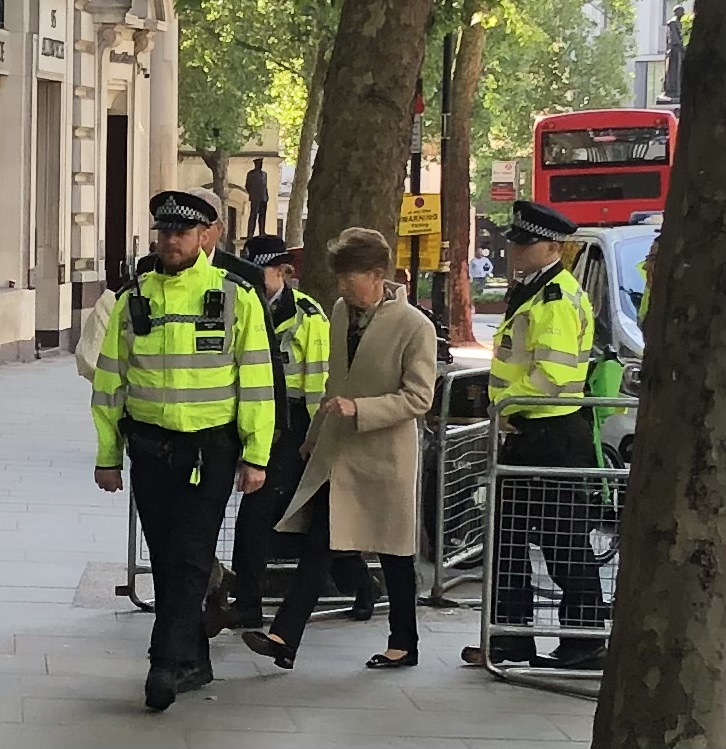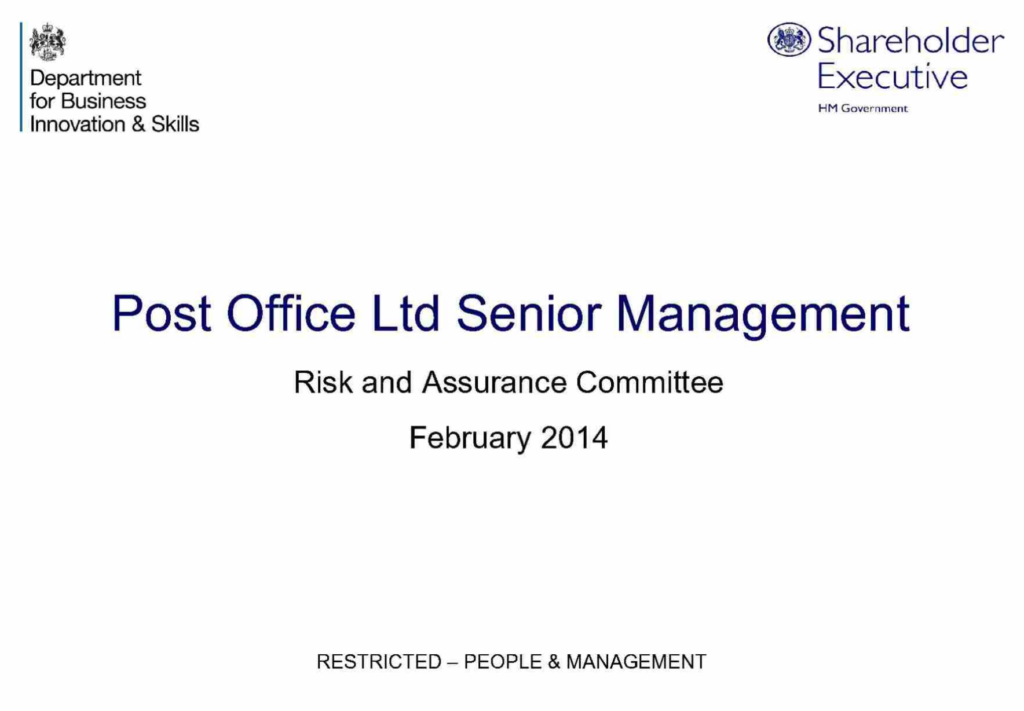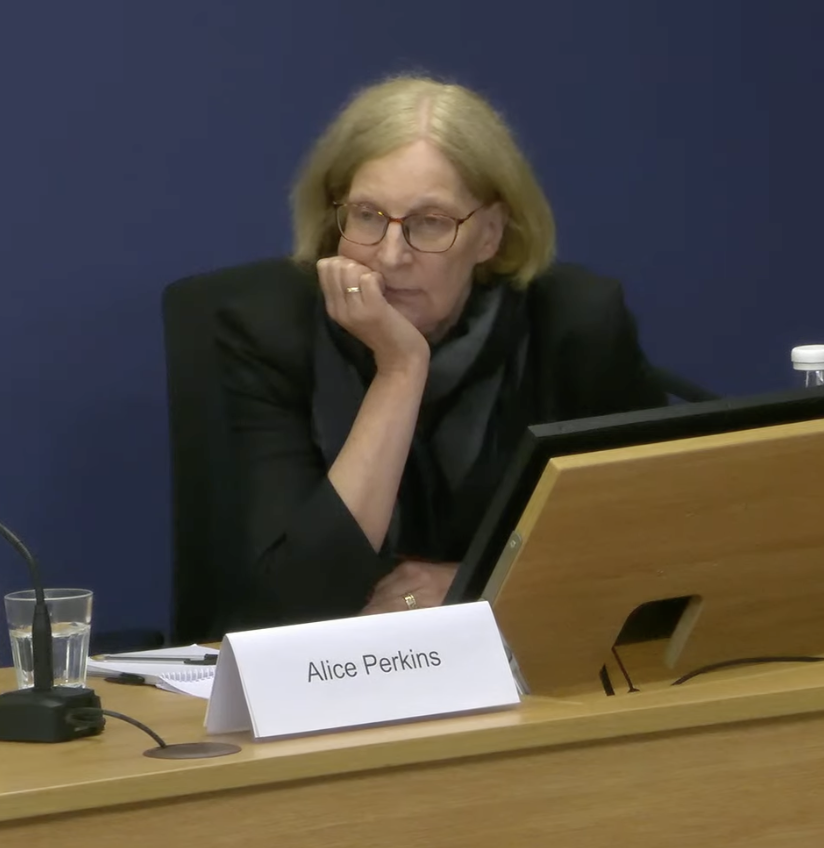
A powerpoint slide deck was the most newsworthy element to leap out of former Post Office chair Alice Perkins’ second day of evidence at the Post Office Horizon IT Inquiry today.
Thanks to an anonymous nine-page presentation, we know that in February 2014 the government was tempted to sack Post Office CEO Paula Vennells because people were saying she wasn’t very good at her job.
To give some context, by 2014, Paula Vennells was coming up to two years in post. The Post Office’s complaint and mediation scheme for Subpostmasters was underway. Independent investigators Second Sight were digging into the Post Office’s dysfunction, a £640m government subsidy had been handed over and a massive change to Subpostmaster working practices and remuneration called Network Transformation was getting underway.
The first slide of the powerpoint deck carries the logo of the Business Department (now DBT) and the Shareholder Executive (now UKGI) logos. It has the title Post Office Ltd Senior Management Risk and Assurance Committee and is marked “Restricted – People and Management” on the front slide, and then “Restricted – Policy and Commercial” on the rest. Make up yer mind, lads.

The summary on the second slide states: “There is a general consensus that Paula is no longer the right person to lead POL [Post Office Ltd], but justification is anecdotal.”
Under the heading “Why is Paula’s position under review?” the summary continues:
“The 2010 plan, which admittedly was not hers, failed to deliver the expected revenue growth, and the Network Transformation has required political awkward revisions to remain deliverable. Paula has not shown an understanding of political considerations (ie. presentation of plan to Ministers) or of the detail of the plan, and she has been unable to work with personalities that provide robust challenge to her.”
On the option slide titled “Remove” the assessment reads:
“There is a general feeling that Paula is not the optimal person to lead POL to deliver its commercial strategy. Paula has not been able to establish good working relationships with Jo Swinson [then Postal Affairs Minister]. She has been unable to retain key staff.”
It goes on to say that under Vennells, the Post Office “refused to keep Govt properly appraised of developments in the NT [Network Transformation] programme, requiring difficult revisions in 2013. She has shown a worrying lack of knowledge about the detail of the new plan.”
Furthermore: “Paula’s people management has caused concern as she appears unable to work with personalities and approaches that differ from hers, and has failed to build relationships with key Directors.”
On the same slide, the anonymous author notes: “Paula’s performance as CEO has been questioned by the POL Chair, and by members of the Board”.
Everybody Knew

Whilst giving evidence this morning, former Post Office chair Alice Perkins was at pains to point out that not only had she not seen this document, she found it “a surprise” that “these sorts of detailed conversations were going on and that nobody told me that they were going on at the time… I knew that the minister had some reservations but I had absolutely no idea that there was this machinery inside the Department that was having these conversations.”
But Vennells’ uselessness was an open secret, even at the Post Office. Perkins told the Inquiry: “In 2014, I did start, and I wasn’t alone in this, to have reservations about Paula’s ability to lead the Post Office in the circumstances which it found itself in.”
Jason Beer KC, who questioned Perkins today on behalf of the Inquiry, asked: “Is it right to those concerns included a doubt as to her personal grip specifically on Horizon issues?”
“Yes”, replied Perkins “and it went beyond that.”
Beer wanted to know how and where ShEx and the Business department had got the idea that Vennells wasn’t up to snuff.
“I think they would have got it from a number of sources”, replied Perkins, fingering Richard Callard, the ShEx rep who sat on the Post Office board. According to Perkins he “would have seen Paula operating in the context of the board, would have heard conversations, would have been party to conversations that I and the other non-executive directors were having”.
Then there would have been “feedback, I’m sure from the minister and the minister’s office” and there would have been “interactions with officials at different levels in the department”.
Was Perkins herself party to all of this, wondered Beer? Oh yes, she confirmed: “I would have had conversations from time to time with various people in the Department… this would have been a topic of conversation on a pretty regular basis.”
“To your knowledge”, asked Beer “which other members of the board had questioned her performance?”
“I think everybody had by this stage”, replied Perkins.
So Vennells was universally recognised as a bit of a duffer by everyone around her.
Of course, their instincts were right. Paula Vennells went on to preside over the corporate cover-up of a catastrophic miscarriage of justice which:
– ruined the Post Office’s reputation
– destroyed the financial worth of the Post Office network (UKGI currently rate the value of the network at £0)
– ruined the morale of serving Subpostmasters who saw their remuneration and value of their branches collapse
– cost more than a billion pounds to put right
But this only happened after the government gave Vennells a CBE, a seat on the Cabinet Office board and a plum job running an NHS Trust. Never in the history of corporate leadership has such mediocrity failed upwards so spectacularly.
Why wasn’t Vennells shown the door in 2014, then? In the powerpoint slide giving the “Retain” rationale, we read Vennells “has performed adequately, meets most of the desired skills, is relatively inexpensive, and has a knowledge and understanding of the business.” It concluded:
“The reasons for retaining Paula are largely negatively framed, posited in avoiding the risk of disruption… but this reflects the reality of the situation.”
It seems that doing nothing and hoping for the best won the day. Download the full document here.
A lengthy write-up of Day 1 of Alice Perkins evidence can be found here with a preview here. Read the live tweets from today here.
The journalism on this blog is crowdfunded. If you would like to join the “secret email” newsletter, please consider making a one-off donation. The money is used to keep the contents of this website free. You will receive irregular, but informative email updates about the Post Office Horizon IT scandal.

Leave a Reply